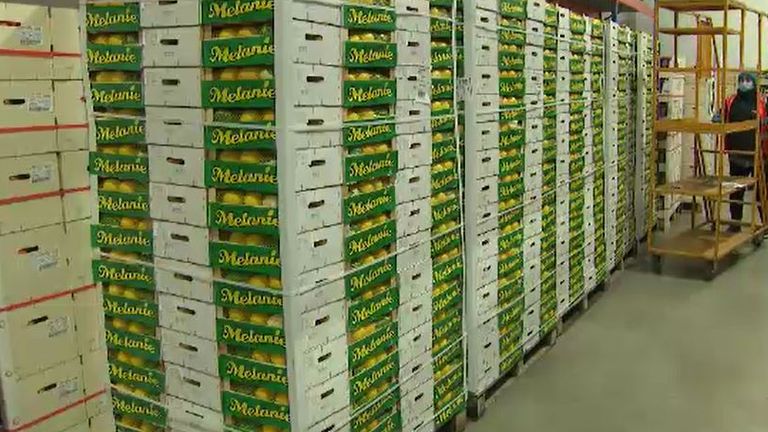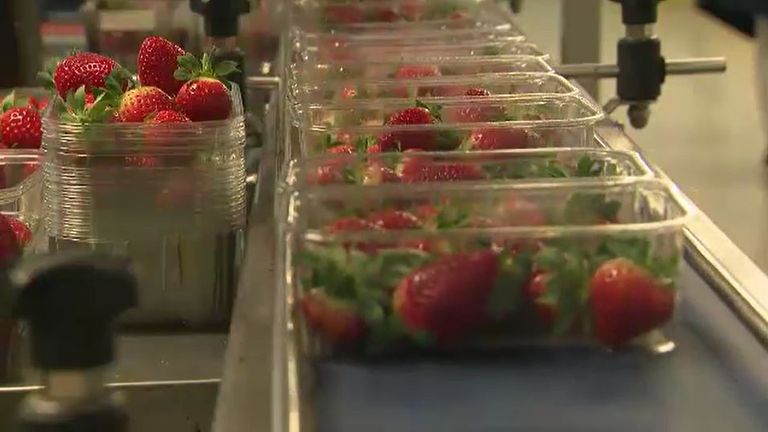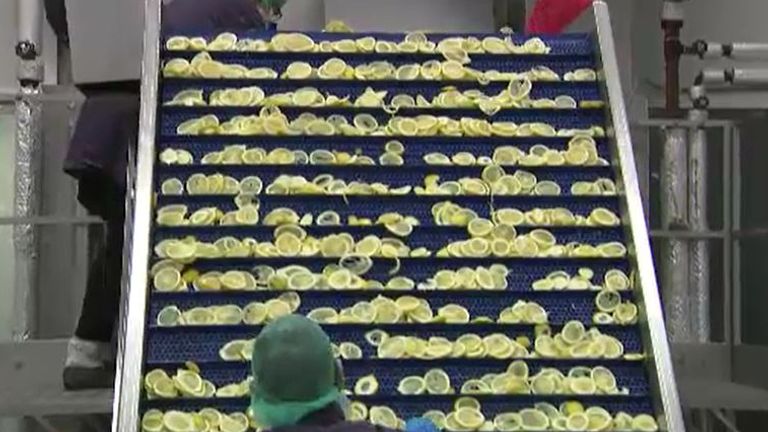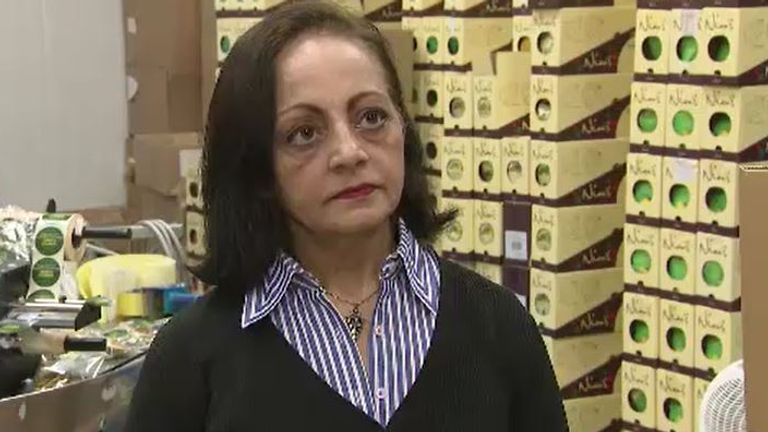Freight traffic between Britain and the EU is down almost a third following the end of the Brexit transition, with new red tape and soaring transport costs prompting some small firms to suspend exports to the continent.
Data seen by Sky News shows lorry freight passing between Britain and its major European trading partners since 1 January has fallen dramatically compared to the same period in 2020.
Daily truck volumes between Britain and European Union countries, including France, Ireland and the Netherlands, fell by 61% in the first days of January and are 29% down on average in the first 20 days of the year, according to logistics data company Sixfold.
At the same time, the cost of moving goods from France to Great Britain has risen 47% year-on-year, while the rejection rate, a measure of hauliers across the continent turning down cross-Channel work, has jumped by 168%.
The findings come as companies across a range of sectors, from fishing and food to Formula 1 and farming, say that the Brexit deal has added cost, complexity and delays to doing business in Europe.
Britain’s departure from the EU has introduced a raft of new customs and safety procedures – “non-tariff barriers” in trade jargon – for European imports and exports.
Previously these only applied to UK trade with non-EU destinations, known as third countries.
This has been compounded by the sudden introduction of mandatory COVID testing by the French government in the week before Christmas, which has added another layer of complexity of what was previously a frictionless border.
Government officials told MPs on Thursday that as many as 200 lorries are being turned back from the Dover and Folkestone short straits crossings every day, with on average 5% of vehicles found to be non-compliant.
Now the UK is itself a third country, food importers and manufacturers have told Sky News they fear the new border arrangements will make the UK less attractive to European companies.
One told Sky News it had suspended exports while the new regulations bed in.
Rodanto, a family-run fruit grower and importer, has 68 years’ experience trading across the continent and owns farms in Spain and Morocco as well the UK, including its base in Sidcup, Kent.
Even with vast experience, its own fleet of lorries, and staff in Europe, it has found the change of systems tough.
Import manager Edward Velasco said Brexit has compounded the challenge of dealing with the disruption of coronavirus, and a destructive cold snap in Spain that hit supplies of citrus fruits and some vegetables including broccoli.
Mr Velasco said he “likes to be positive” about the prospect for business and said he expected border procedures to settle down, but he was concerned about the long-term impact of delays to cross-border trade.
“The challenges of getting fresh produce here makes it less attractive,” he said.
“We’ve got new challenges every week it seems, and it does make it less attractive.”
“Hauliers have an extra cost in coming here, they don’t know if their drivers are going to get back within a certain amount of time.
“If the wheels aren’t moving they’re losing money and ultimately so are we so it does create an extra challenge and it makes the UK less attractive.”
Nim’s Fruit Crisps, based 30 miles away in Sittingbourne, would usually source the raw materials for its air-dried fruit and vegetable crisps from European providers.
Delays to deliveries from Spain before Christmas forced them to look elsewhere, eventually importing lemons from Egypt that were delivered by ship in weeks rather than by lorry within 48 hours.
The company has grown rapidly over the last eight years, placing its products in 2,000 Tesco stores, producing own-brand produce for M&S, as well as growing exports to five European countries.
But owner Nimisha Raja says she has decided to stop all trade with Europe for a month while the new systems bed in, hoping that in time it will become cost-effective.
“We decided that for the month of January we are not going to import anything from the EU, we’re not going to export to the EU until we fully get the handle of what it means to export to the EU.
“Now we were selling to five different countries but we stopped exporting pretty much last year leading up to this.
“Exporting and importing is really difficult for a small business like ours.
“For exporting it’s a lot of added costs, for staffing, for all the documentation, we have to pay for a lot of documentation as well, like certificate of origin.”
Complex rules-of-origin regulations that attract taxes on goods passed from third countries to European customers by UK companies have also increased consumer prices.
The fishing industry has found the change particularly disruptive, with a third of the Scottish fleet tied up and volumes traded through Peterhead, the largest fish market in Europe, running at a fraction of pre-Brexit levels.
The prime minister and cabinet members have characterised the impact of non-tariff barriers on traders as “teething problems”, preferring to focus on the pre-Christmas COVID border closure ordered by Emanuel Macron and the general impact of coronavirus on European economies.
That was the message when new Business Secretary Kwasi Kwarteng spoke to MPs this week.
“We were in the EU for 47 years,” he said.
“A lot of predictions of total congestion and chaos have not materialised, that doesn’t mean we are out of the woods.
“But the most scary predictions were not borne out in reality.
“I’m confident that we will be able to get to a regime where we will have to get to a much smoother process.”
Government officials confirmed to MPs on Thursday that trade is at around 70% of last January’s level.
Emma Churchill, director general of the Border Protocol Group, told the Public Accounts Committee that between 3% and 8% of freight vehicles were being turned back at the border.
This is lower than anticipated, with compliance with new paperwork including the Kent Access Permit required to pass through the county higher than expected.
Some 636 fines have been issued for non-compliance with the KAP.
Ms Churchill also suggested trade volumes may not recover to 100% of last year because of COVID, which depressed trade to around 80% of average levels during the March lockdown.






